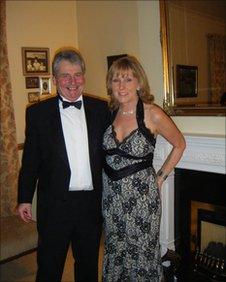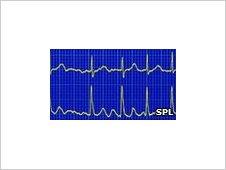A chaotic heartbeat 'is a warning'
- Published

James had no symptoms
Do you know how to check your pulse? Would you know if your heartbeat was regular or irregular?
In our lifetimes, one in four of us will develop atrial fibrillation, or AF.
AF causes the heart to beat chaotically, increasing the risk of blood clots and - if the condition is left untreated - stroke.
Each year the condition costs the NHS millions.
Warning sign
AF patients are five times more likely to experience a stroke, with a quarter of all strokes caused directly by AF. The risk increases with age.
James Hutton, now 62, was a strong fit man and a former rugby player. But two years ago, seemingly without warning, he collapsed with a stroke.
He has now almost completely recovered. His wife Jenny says she had spotted a problem three weeks before he collapsed, but just did not understand its importance.
"We were lying in bed watching TV and I had my head on his chest," said Jenny, from Nottinghamshire.
"I said to him: 'God, your heart's all over the place.'"
But because they did not realise its significance they ignored the symptom.
"I had not heard of AF and did not know anyone who had had a stroke it was all alien territory to me, said Jenny.
Treatment regime
Since his stroke, James has undergone three procedures to put his heart back in to rhythm. And for the last six months it seems to have been successful.

AF costs the NHS millions a year
But Jenny said it had been a tough time.
"I used to listen to his heart three times a day after the stroke; I used to half scare myself to death listening.
"The stroke completely and utterly turned our lives upside down.
"Life was as difficult as you could imagine."
For 11 months her husband, an eco-insulation expert, could not work or drive, and for the first couple of months he was quiet and withdrawn. Even now he experiences some weakness down his right hand side.
But James said he feels 100% better.
"I look a picture of health and feel fairly well. I do feel a hell of a lot better, but it is always at the back of our minds."
As well as treatment to restore the heart back to a normal rhythm, patients like James can be offered drugs such as warfarin to reduce the risk of having a stroke by reducing blood clotting.
Know your pulse
Dr Derick Todd, Consultant Electrophysiologist at The Cardiothoracic Centre, Liverpool, said just knowing your pulse, which should be between 60 and 100 beats per minute could save your life.
"AF is a very common problem, it affects 1-2% of the population," he said.
"In our lifetimes one in four of us will get AF.
"It is very common in the elderly, less so in young people, but it will get to many of us in the end.
"It always carries a risk with it. The main risk we are worried about is an increased risk of stroke - it increases your risk five fold.
"Those who don't know they have got it are going along without the correct treatments to prevent strokes.
"Anybody can be at risk, but especially people as they are getting older, those with risk factors such as high blood pressure, diabetes and other heart disease.
"We need to know what these people's pulses are doing. It is really important."
Trudie Lobban, chief executive of the Atrial Fibrillation Association, agreed: "Failure to diagnose and treat AF causes untold misery and costs the NHS millions of pounds every year.
"This is a bleak picture but it doesn't need to be this way. Some relatively straightforward measures could transform the situation socially, medically and financially."